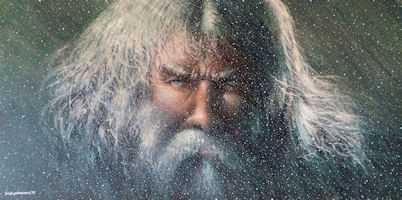What The Heck Is Ullr?
 ULLR Foundation |
Club Forms & Documents |
Favorite ULLR Recipes |
MORE LINKS... |
| Return to ULLR Homepage |
To View & Print Flyers, You Need Adobe Acrobat Reader: |
| Updated 11/04/2020 |
“Ullr: Nordic God of Snow and Winter” |
(click to enlarge) Original acrylic painting by Floyd Johnson, ULLR Ski Club member 1960's-1980's |
Source: Encyclopedia Mythica |
"Glory." The son of Sif, and the stepson of Thor. Ullr is associated with archery, hunting, skating, and skiing,
as attested by numerous kennings in skaldic verses. His
dwelling-place is Ţdalir. Snorri Sturluson lists him among the
Ăsir and says that he is “so excellent a bowman, and so swift on snowshoes, that none may contend with him.
He is also fair of aspect and has the accomplishments of a warrior; it
is well to call on him in single-combats.” His name is not found
in the Nafna■ulur. |
|
Source: Wikipedia, The Free Encyclopedia |
In
early Germanic paganism, Wul■uz ("glory") appears to have been an
important concept, perhaps personified as a god, or an epithet of an
important god; it is continued in Old Norse tradition as Ullr, a god
associated with archery. The term wol■u- "glory" (cf. Old English
wuldor and the Gothic wul■us), possibly in reference to the god, is
attested on the 3rd century Thorsberg chape (as owl■u-), and there are
many placenames in Ullr and a related name, Ullinn, but medieval
Icelandic sources have only sparse material on the god Ullr. The
medieval Norse word was Latinized as Ollerus. The Icelandic form
is Ullur. In the mainland North Germanic languages, the modern
form is Ull. In chapter 31 of Gylfaginning in the Prose Edda, written in the 13th century by Snorri Sturluson, Ullr is referred to as a son of Sif (with a father unrecorded in surviving sources) and as a stepson of Sif's husband; the major Germanic god Thor: "Ullr, Sif's son and Thˇr's stepson, is one [too]. He is such a good archer and ski-runner that no one can rival him. He is beautiful to look at as well and he has all the characteristics of a warrior. It is also good to call on him in duels." – Young's translation In Skßldskaparmßl, the second part of the Prose Edda, Snorri mentions Ullr again in a discussion of kennings. Snorri informs his readers that Ullr can be called ski-god, bow-god, hunting-god and shield-god. In turn a shield can be called Ullr's ship. Despite these tantalising tidbits Snorri relates no myths about Ullr. It seems likely that he didn't know any, the god having faded from memory. Snorri's note that a shield can be called Ullr's ship is borne out by surviving skaldic poetry with kennings such as askr Ullar, far Ullar and kjˇll Ullar all meaning Ullr's ship and referring to shields. While the origin of this kenning is unknown it could be connected with the identity of Ullr as a ski-god. Early skis, or perhaps sleds, might have been reminiscent of shields. A late Icelandic composition, Laufßs-Edda, offers the prosaic explanation that Ullr's ship was called Skj÷ldr, "Shield". Ullr's name appears in several important Norwegian and Swedish place names (but not in Denmark or in Iceland). This indicates that Ullr had at some point a religious importance in Scandinavia that is greater than what is immediately apparent from the scant surviving textual references. It is also probably significant that the placenames referring to this god are often found close to placenames referring to another deity: Nj÷rr in Sweden and Freyr in Norway. Some of the Norwegian placenames have a variant form, Ullinn. It has been suggested that this is the remnant of a pair of divine twins and further that there may have been a female Ullin, on the model of divine pairs such as Fj÷rgyn and Fj÷rgynn. Viktor Rydberg in his Teutonic Mythology makes Ullr the son of Sif and Egill-Írvandill, half-brother of Svipdagr-Ër, nephew of V÷lundr and a cousin of Skai. His father, Egill, was the greatest archer in the mythology, and Ullr follows in his father's footsteps. Ullr helped Svipdagr-EirÝkr rescue Freyja from the giants. He also ruled over the Vanir when they held ┴sgarr during the war between the Vanir and the Ăsir. Within the winter skiing community of Europe the Old Norse god "Ullr" is considered the Guardian Patron Saint of Skiers (German Schutzpatron der Skifahrer). An Ullr medallion or Ullr ski medal, depicting the Scandinavian god Ullr on skis holding a bow and arrow, is widely worn as a talisman by both recreational and professional skiers as well as ski patrols in Europe and elsewhere. The town of Breckenridge, Colorado hosts a week-long festival called "Ullr Fest" each year in January, featuring numerous events designed to win his favor in an effort to bring snow to the historic ski town. Breck Ullr Fest was first held in 1963. |
|
Ullr - The Man, The Myth |
by David McKee, Vancouver, BC, Canada |
| You
know the feeling-you are on your skis working the rhythm, enjoyin' the
speed, and suddenly for a few turns, you feel immortal. The
feeling is difficult to describe but perhaps you sensed a little
inspiration from Ullr, the god of choice among Scandinavians and
backcountry snow lovers alike. Ullr, a.k.a. Uller, Ullin, Holler, Vulder, and Ull, is a pre-Viking era Nordic god and he kept fine company with the likes of Odin, Thor, and other esteemed deities. Among his many skills, he was the god of skiing, archery, hunting, and was known to be quite promiscuous (which he may have inherited from his mother Sif, the Goddess of Fertility). Sure, Ullr had some neat traits but in our world of plastic boots, cap skis, laser sights, and Viagra, it's easy to dismiss them as the quaint skills of some randy old god. Nevertheless, think back to the days when being noted as a master archer was no slight task. At the time, Ullr was competing with the likes of Thor, who brandished a hammer capable of shooting lightning bolts in battle (sort of like skiing old Karhu XCD's while your buddy is on a pair of AK Launchers). Then there was Loki the trickster, who could assume the form of animals to deceive or escape the wrath of the gods. Despite his lack of supernatural powers (aside from skiing), Ullr was the name invoked to warrant good luck when undertaking a duel. His name, which means glorious or dazzling, clearly reflects his abilities, and myth has it he once held the seat of the highest god. His character and the legends associated with it are pervasive throughout the historic tales of the Vikings, Goths, Saxons, and ancient Britons. Basically, Ullr rules! In addition to dueling, gods were also known to have a penchant for good times, and Ullr, when he was not out making fresh tracks, was known to flirt with the Goddesses on a regular basis. His sexual prowess is legendary and if modern pop culture is any indication, then the goddesses may well have been sporting horns and pointy metal bras - necessitating some smooth talkin' and delicate moves on Ullr's part (and you thought the obstacle course on Survivor was tough). As an historical aside: Ullr's sexual prowess seems to support archaeological evidence that polypropylene underwear has not existed until recent times given the effect sweaty polypro has on most folks' amorous inclinations. However, most important to us snow lovers, Ullr is the god of skiing. As the undisputed master of skis, he often used his skill to escape from foes or track down prey in addition to shredding fresh POW. In a sport intimately tied with Scandinavian tradition, it is no wonder that in Norway there are a number of place names that incorporate the name of Ullr. In the days of Ullr, skis were not entirely what we'd recognize today. In fact, what we know as skis probably did not evolve until the last century. In the time of the gods, skis were akin to two planks of wood - one wrapped with cord to provide traction. As people were often hunting or at war, a single ski pole was often used, allowing a free hand for a weapon. It is said that Ullr was such a great skier that he would streak across the sky leaving the brilliant stars as his trails (they obviously had some fine powder days). Though very skilled, Ullr guarded his knowledge closely and refused to show the other gods how to ski. Luckily for us, he let the secret out of the bag and we will all be soon celebrating his glory. Next time you are trying to bash through some wind crust or plunge head first into fresh waist deep powder, be sure to invoke his name and remember - ULLR RULES! |

